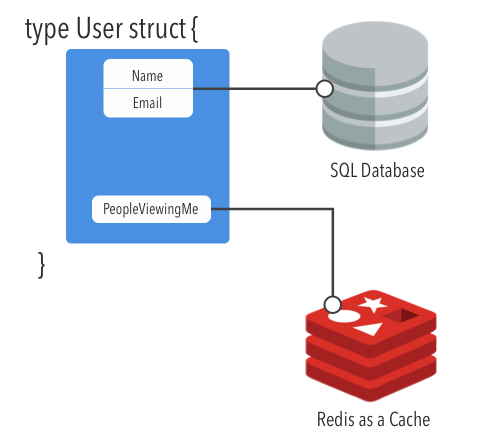This package provides a way to add fetch & commit (with N zones) semantics to your struct instances.
You have a user model that has a name and email loaded from a SQL server but their people_viewing_me that is computed from another datasource like redis:
Let's start with a user object. We embed the lz LZoned structure into our User model:
type User struct {
// SQL Zone
Name string
Age int
// Some other data-store (e.g. Redis)
PeopleViewingMe []People
lz lzoned.LZoned
}For each struct definition (i.e. not instance level, class level), you will need to create an LZArena and add a set of zones.
// Create an LZArena to store our zone operations
var UserArena = NewLZArena()
// Add our zones to the arena
var UserSQLZone = UserArena.AddZone(LZops{
Fetch: func (obj {}interface) {
u := obj.(*User)
SqlQueryToGetNameAndAge(u)
},
Commit: func (obj {}interface, tags []string) error {
u := obj.(*User)
StartSQLTransaction()
for _, tag := range tags {
switch tag {
case 'name':
UpdateNameViaSQL(u)
case 'age':
UpdateAgeViaSQL(u)
}
}
// If commit fails, it will return an error
err := CommitSQLTransaction()
return err
})
var UserRedisZone = UserArena.AddZone(LZops{
Fetch: func (obj {}interface) {
u := obj.(*User)
RedisQueryToGetPeopleViewingMe()
},
Commit: func (obj {}interface, tags []string) {
u := obj.(*User)
Panic("unsupported")
},
})
func NewUser() *User {
u := &User{}
//Ensure lz is initiatilized
u.lz.Init(UserArena, u)
}For your applicable getters on your model, you need to add a Fetch before attempting to read from the model. This Fetch call won't do anything if the data was previously fetched but not dirty.
func (u *User) GetName() string {
// Will only call once if zone is not fetched. Sets state to clean.
u.lz.Fetch(UserSQLZone)
}For your applicable setters on your model, you need to note that a zone has been dirtied. You can add 'tags' which will be available in your commit routine so you can update only the fields that have changed.
func (u *User) SetName(name string) string {
u.lz.SetDirty(UserSQLZone, "name")
u.Name = name
}Now your ready to call err := u.lz.Commit() when you're ready to save all dirty changes. If any of the zones fails to commit (zone commit ops returns error), then this will return the first error and not complete the commit.
♥ This project is intended to be a safe, welcoming space for collaboration, and contributors are expected to adhere to the Contributor Covenant code of conduct.
- If you found a bug, open an issue.
- If you have a feature request, open an issue.
- If you want to contribute, submit a pull request.
Todo
lzoned is released under the MIT license. See LICENSE for details.


